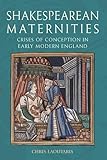Shakespearean Maternities : Crises of Conception in Early Modern England / Chris Laoutaris.
Material type: TextPublisher: Edinburgh : Edinburgh University Press, [2022]Copyright date: ©2008Description: 1 online resource (320 p.) : 94 B/W illustrationsContent type:
TextPublisher: Edinburgh : Edinburgh University Press, [2022]Copyright date: ©2008Description: 1 online resource (320 p.) : 94 B/W illustrationsContent type: - 9780748624362
- 9780748630424
- online - DeGruyter
| Item type | Current library | Call number | URL | Status | Notes | Barcode | |
|---|---|---|---|---|---|---|---|
 eBook
eBook
|
Biblioteca "Angelicum" Pont. Univ. S.Tommaso d'Aquino Nuvola online | online - DeGruyter (Browse shelf(Opens below)) | Online access | Not for loan (Accesso limitato) | Accesso per gli utenti autorizzati / Access for authorized users | (dgr)9780748630424 |
Browsing Biblioteca "Angelicum" Pont. Univ. S.Tommaso d'Aquino shelves, Shelving location: Nuvola online Close shelf browser (Hides shelf browser)

|

|

|

|

|

|

|
||
| online - DeGruyter Contemporary British Fiction / | online - DeGruyter About Time : Narrative, Fiction and the Philosophy of Time / | online - DeGruyter A History of Everyday Life in Twentieth-Century Scotland / | online - DeGruyter Shakespearean Maternities : Crises of Conception in Early Modern England / | online - DeGruyter Scottish Newspapers, Language and Identity / | online - DeGruyter Pressure Groups / | online - DeGruyter Death and the Moving Image : Ideology, Iconography and I / |
Frontmatter -- Contents -- Acknowledgements -- Note on the Text -- List of Illustrations -- Introduction: Constructing Maternal Knowledge -- Chapter 1 Flesh and Stone: Dissecting Maternity in the Theatre of Anatomy -- Chapter 2 The Cabinet of Wonders: Monstrous Conceptions in the Theatre of Nature -- Chapter 3 Strange Labours: Maternity and Maleficium in the Theatre of Justice -- Chapter 4 Speaking Stones: Memory and Maternity in the Theatre of Death -- Postscript: Our Maternities: The Historical Legacy -- Selected Bibliography -- Index
restricted access online access with authorization star
http://purl.org/coar/access_right/c_16ec
This study explores maternity in the 'disciplines' of early modern England. Placing the reproductive female body centre-stage in Shakespeare's theatre, Laoutaris ranges beyond the domestic sphere in order to recuperate the wider intellectual, epistemological, and archaeological significance of maternity to the Renaissance imagination.Focusing on 'anatomy' in Hamlet, 'natural history' in The Tempest, 'demonology' in Macbeth, and 'heraldry' in Antony and Cleopatra, this book reveals the ways in which the maternal body was figured in, and in turn contributed towards the re-conceptualisation of, bodies of knowledge. Laoutaris argues that Shakespeare resists a monolithic concept of motherhood, presenting instead a range of contested 'maternities' which challenge the distinctive 'ways of knowing' these early disciplines worked to impose on the order of created nature.Key FeaturesProvides a new interpretation of a subject which is becoming increasingly popular among Shakespeare scholars, cultural and medical historians, and feminist criticsFocuses on four of Shakespeare's best-loved playsPresents striking visual material which forms a central component of the book's critical methodology, including anatomical plates, cabinets of curiosity, early modern follies and grottoes, artefacts of witchcraft and superstition, Renaissance 'monsters', ceramics, portraiture, funerary monuments and statuaryOffers an interdisciplinary approach to the study of maternity drawing on literary studies, gender studies, the history of art, archaeology, and the history of the sciences
Mode of access: Internet via World Wide Web.
In English.
Description based on online resource; title from PDF title page (publisher's Web site, viewed 29. Jun 2022)


